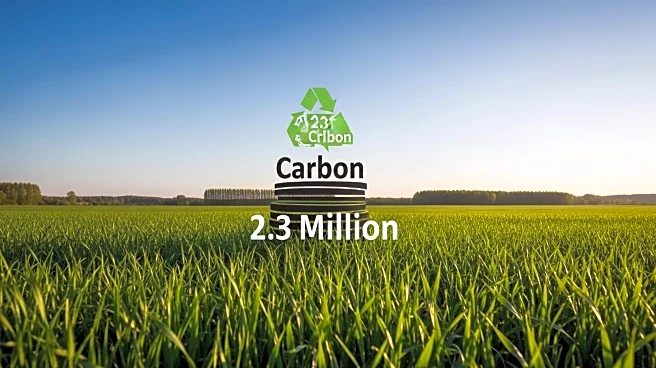What's Happening?
Agreena, a Danish carbon credit company, has reached a significant milestone with its AgreenaCarbon Project, becoming the first large-scale arable farming initiative verified under Verra's Verified Carbon Standard (VCS) VM0042 methodology. The project has issued 2.3 million Verified Carbon Units (VCUs), enabling farmers and corporations to engage in climate action aligned with global sustainability goals. The initiative spans 1.6 million hectares across multiple European countries, emphasizing soil health, biodiversity restoration, and greenhouse gas reductions. Agreena finances farmers' transition to regenerative practices, verifies their impact using AI-driven digital measurement, and offers corporates access to high-quality carbon offsets.
Why It's Important?
The verification of AgreenaCarbon Project underscores the credibility of agriculture-based carbon credits, providing a trusted mechanism for corporates to meet ESG targets while supporting agricultural ecosystems. The project has already contributed to significant carbon reduction milestones, such as cutting nearly 1.2 million tonnes of CO2 and capturing over 1.1 million tonnes in soils. This development is crucial as agriculture accounts for 22% of global anthropogenic emissions, making soil management a key pillar in climate mitigation strategies. The success of Agreena's approach could drive broader adoption of regenerative practices, offering diversified credit profiles to meet market needs.
What's Next?
As the regenerative agriculture market is poised for rapid expansion, with projections indicating growth to USD 18.3 billion by 2030, Agreena's verified carbon credits are expected to lead the next wave of climate action. Corporations pursuing reliable carbon offsets and consumers demanding climate-resilient food will likely drive further growth. Agreena's integration with tokenized carbon marketplaces and digital platforms aims to lower transaction costs, facilitating participation from smallholders and large enterprises. The continued verification processes will enhance confidence in regenerative carbon credits, benefiting farmers, businesses, and the planet.
Beyond the Headlines
The AgreenaCarbon Project highlights the potential of regenerative agriculture to redefine conventional farming practices. By focusing on rebuilding organic matter, enhancing biodiversity, and fostering resilience, these practices not only generate carbon removal credits but also contribute avoidance credits by reducing emissions from fertilizer use or energy consumption. The project demonstrates how financial support, scientific rigor, and farmer-focused practices can drive regenerative agriculture into the mainstream, creating new revenue streams through nature's restoration.









